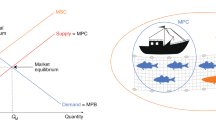Abstract
The Nature Conservancy, the world’s largest environmental NGO, has launched an audacious plan to negotiate debt-for-ocean swaps in Southern coastal and small island states, linked to the international pledge of 30 × 30. Representing an evolution from the debt-for-nature swaps popularized in the 1990s, these new variants are regularly praised as ingenious solutions to the debt and biodiversity crisis. Gabon is the latest country to have concluded a swap, bringing the total value of debt exchanged to over US$2.5 billion. However, there are several concerns about these opaque transactions from the perspective of debt justice and the democratic and equitable governance of marine resources. Debt-for-ocean swaps illustrate the pace at which financialization has transformed international approaches to conservation and the risks that this brings.
Similar content being viewed by others
Notes
See for example the statement denouncing debt swaps by the Climate Action Network: https://climatenetwork.org/wp-content/uploads/2023/06/CAN-position-on-Debt-Swaps_May-2023.pdf.
This was initially set out under the Enterprise for the America’s initiative, and then later under the Tropical Forest Conservation Act.
For more on the financialization of TNC Standing (2021).
A good example comes in the discussion between panellists on TNC’s debt swaps held at Blomberg’s Green Summit in 2023, https://www.youtube.com/watch?v=6IlSBtiK71o.
Economic Commission for Latin America and the Caribbean (ECLAC), Public debt and development distress in Latin America and the Caribbean (LC/TS.2023/20), Santiago, 2023: https://repositorio.cepal.org/server/api/core/bitstreams/d84a5041-0a2c-4b8e-9b01-d91b187477ce/content.
“Ecuador reaches deal with China to restructure debt”, Reuters, 20 September 2022, https://www.reuters.com/world/americas/ecuador-reaches-deal-with-china-restructure-debt-2022-09-20/.
Lough, R. ‘Seychelles launches defaulted bond exchange offer’, Reuters, 15.t December, 2009, https://www.reuters.com/article/seychelles-eurobond-idAFLDE5BE16120091215.
White, N. ‘Wall Street’s new ESG money maker promises conservation-with a catch’, Bloomberg News, 12 January, 2023: https://www.bloomberg.com/news/articles/2023-01-12/bankers-bet-millions-on-sovereign-debt-deals-tied-to-green-goals.
The terms of this loan can be found in TNC’s financial statement for 2022, https://www.nature.org/content/dam/tnc/nature/en/documents/TNC-Financial-Statements-FY22.pdf. The author has also received a breakdown of interest rate and principal payments due from Belize to TNC by an anonymous source in the Belize government.
This is explained in a webinar presentation provided by TNC, https://www.youtube.com/watch?v=vkp7gAgR4X0.
’Belize shows the growing potential of debt-for-nature swaps’, The Economist, 13 November, 2021, available at: https://www.economist.com/finance-and-economics/2021/11/13/belize-shows-the-growing-potential-of-debt-for-nature-swaps.
’Revealed: 97% of UK marine protected areas subject to bottom trawling’, The Guardian, 9 October, 2020, https://www.theguardian.com/environment/2020/oct/09/revealed-97-of-uk-offshore-marine-parks-subject-to-destructive-fishing.
For a discussion on the the marginalization of small-scale fisheries in marine spatial planning and blue growth strategies Cohen et al. (2019).
See the statement by the Rainforest Foundation: ‘30 × 03: The good, the bad, and what needs to happen next’, https://www.rainforestfoundationuk.org/wp-content/uploads/2023/01/30x30_The-Good-the-Bad-and-What-needs-to-happen-next_EN.pdf.
References
Aligiri, Priya. 1992, Give Us Sovereignty or Give Us Debt: Debtor Countries’ Perspective on Debt-for-Nature Swaps. American University Law Review 41(1): 485–516. https://core.ac.uk/download/pdf/235408573.pdf
Cardiec, Floriane, Sophie Bertrand, Matthew J. Witt, Kristian Metcalfe, Brendan J. Godley, Catherine McClellan, Raul Vilela, Richard J. Parnell, and François le Loc’h. 2020. “Too Big To Ignore”: A feasibility analysis of detecting fishing events in Gabonese small-scale fisheries. PLoS ONE 15(6): e0234091. https://doi.org/https://doi.org/10.1371/journal.pone.0234091
Carrington, Damian. 2018. Debt for dolphins: Seychelles creates huge marine parks in world-first finance scheme, The Guardian, 22 February: https://www.theguardian.com/environment/2018/feb/22/debt-for-dolphins-seychelles-create-huge-new-marine-parks-in-world-first-finance-scheme
Cohen, Philippa J. et al. 2019. Securing a just space for small-scale fisheries in the blue economy, Frontiers of Marine Science, https://www.frontiersin.org/articles/https://doi.org/10.3389/fmars.2019.00171/full
Cole, Daniel H. 1992. Debt-Equity Conversions, Debt-for-Nature Swaps, and the Continuing World Debt Crisis. Articles by Maurer Faculty. 690. Maurer School of Law: Indiana University. https://www.repository.law.indiana.edu/facpub/690
Dezséri, Kálmán. 1990. Debt-equity-swaps: solution or illusion?, Savings and Development 14(3): 219–32. http://www.jstor.org/stable/25830231
Fang, Chuck, Julian Schumacher, and Christoph Trebesch. 2020. Restructuring Soverign Bonds: Holdouts, Haircuts and the Effectiveness of CACs, Working paper series, European Central Bank, https://www.ecb.europa.eu/pub/pdf/scpwps/ecb.wp2366~5317a382b3.en.pdf
General Accounting Office. 1991. Report to Congressional Requesters – Develo** Country Debt: Debt Swaps for Development and Nature Provide Little Debt Relief – PC-AA-208, Washington.
McGowan, Jennifer, Rob Weary, Leah Carriere, Edward T. Game, Joanna L. Smith, Melissa Garvey, and Hugh P. Possingham. 2020. Prioritizing debt conversion opportunities for marine conservation, Conservation Biology. 34: 1065-1075.
Minzi, Maurizio Levi. 1993. The pied piper of debt-for-nature swaps, University of Pennsylvania International Business Journal, Vol. 14
Occhiolini, Michael. 1990. Debt for nature swaps, Policy Research Working Paper Series 393, The World Bank
Ortega-Pacheco, Daniel, Iolanda Fresnillo, Patricia Miranda, Rodolfo Bejarano, and Carola Mejia. 2023. Galapagos Deal: An Ignominious Legacy, Latindad, https://www.latindadd.org/2023/05/25/galapagos-deal-an-ignominious-legacy/
Standing, Andrea. 2021. Understanding the conservation finance industry, CFFA-CAPE website, 14 December. https://www.cffacape.org/publications-blog/understanding-the-conservation-finance-industry
Turner, Terisa E., and Craig S. Benjamin. 1995. Not in our nature: the male deal and corporate solutions to the debt-nature crisis, Review (Fernand Braudel Center), 18(2): 209-258.
Van Vliet, Lisette. 1991. Debt-for-Nature Swaps: Transnational environmental politics in a changing global political economy, Master’s Thesis, Department of International Relations, the Australian National University.
Vandermeer, John and Ivette Perfecto. 1995. Breakfast of biodiversity: The Political Ecology of Rain Forest Destruction, Food first books.
Author information
Authors and Affiliations
Corresponding author
Additional information
Publisher's Note
Springer Nature remains neutral with regard to jurisdictional claims in published maps and institutional affiliations.
Rights and permissions
Springer Nature or its licensor (e.g. a society or other partner) holds exclusive rights to this article under a publishing agreement with the author(s) or other rightsholder(s); author self-archiving of the accepted manuscript version of this article is solely governed by the terms of such publishing agreement and applicable law.
About this article
Cite this article
Standing, A. The Financialization of Marine Conservation: The Case of Debt-for-Ocean Swaps. Development 66, 46–57 (2023). https://doi.org/10.1057/s41301-023-00379-y
Published:
Issue Date:
DOI: https://doi.org/10.1057/s41301-023-00379-y




